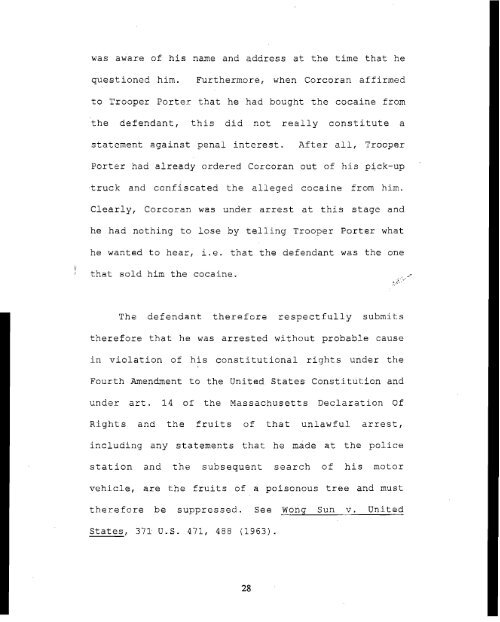464 Mass. 566 - Appellant Montoya Brief - Mass Cases
464 Mass. 566 - Appellant Montoya Brief - Mass Cases 464 Mass. 566 - Appellant Montoya Brief - Mass Cases
the motion to suppress that Corcoran was a reliable informant. Probable cause to arrest a suspect sed on rmation provided by an informant must meet the familiar two part test rived Spinelli v. United States, 303 U.S. 410 (1969) and Aguilar v. Texas, 378 U.S. 108 (19640. See Commonwealth v. Upton, 394 Mass. 363, 369 (1985). The formant must have a basis of knowledge for the information provided, Spinelli, 303 U.S. at p. 410, and the informant must also be reliable, Aguilar, 378 U.S. at p. 108. The defendant concedes that the basis of knowledge prong satisfied in this case. See Commonwealth v. Montanez, 410 Mass. 290, 299-300 (1991). However, the veracity prong has not been satisfi When the Commonwealth relies on a statement inst an informant's penal interest to prove that the in rmation is reliable, the Commonwealth must show that the police knew the informant's identity. Commonwealth v. Allen, 4a6 Mass. 575, 579 (1990), and the informant a reasonable fear of prosecution. Commonwealth v. Melendez, 407 Mass. 53, 57 (1990). In this case, although the occupant of the pick-up truck was identified as Corcoran, there was no evidence at the hearing of the motion to suppress that Trooper Porter 27
was aware of his name and address the time that he questioned him. Furthermore, when Corcoran affirmed to Trooper er that had bought the cocaine from the defendant, this did not really constitute a statement inst 1 interest. After I, Trooper Porter had already ordered Corcoran out of his pick-up 'truck and confiscated the alleged cocaine from him. Clearly, Corcoran was under arrest at t s stage he had nothing to lose by telling Trooper Porter what he wanted to hear, i.e. that the defendant was one sold him the cocaine. The fendant therefore respect lly submits fore that he was arrested without probable cause in violation of s constitutional rights under the Fourth Amendment to the United States Constitution and under art. 14 of the Massachus ts Declaration Of Rights and the fruits of that unlawful arrest, cluding any statements that he made the police station and the subsequent search of his motor vehicle, are the fruits of a poisonous tree and must therefore be suppressed. See Wong Sun v. United States, 371 U.S. 471, 488 (1963). 28
- Page 1 and 2: COMMONWEALTH OF MASSACHUSETTS Appel
- Page 3 and 4: Page No. II. THE DEFENDANT WAS DEPR
- Page 6: Commonwealth v. Levy, 459 Mass. 101
- Page 11 and 12: into the jury room but on this bag
- Page 16 and 17: April 6, 2011, the defendant filed
- Page 19: anot r radio transmission from Troo
- Page 25: Corcoran was prob ly originally an
- Page 31 and 32: indicates t t person would not be f
- Page 37: variable that differentiates the in
- Page 41 and 42: A. The Evidence Concerning The Weig
- Page 47: harmless beyond a reasonable doubt
- Page 52: focused on cribing street level dru
- Page 55 and 56: prejudi al but also inadmiss e hear
was aware of his name and address the time that he<br />
questioned him. Furthermore, when Corcoran affirmed<br />
to Trooper er that had bought the cocaine from<br />
the defendant, this did not really constitute a<br />
statement inst 1 interest. After I, Trooper<br />
Porter had already ordered Corcoran out of his pick-up<br />
'truck and confiscated the alleged cocaine from him.<br />
Clearly, Corcoran was under arrest at t s stage<br />
he had nothing to lose by telling Trooper Porter what<br />
he wanted to hear, i.e. that the defendant was one<br />
sold him the cocaine.<br />
The fendant therefore respect lly submits<br />
fore that he was arrested without probable cause<br />
in violation of s constitutional rights under the<br />
Fourth Amendment to the United States Constitution and<br />
under art. 14 of the <strong>Mass</strong>achus ts Declaration Of<br />
Rights and the fruits of that unlawful arrest,<br />
cluding any statements that he made the police<br />
station and the subsequent search of his motor<br />
vehicle, are the fruits of a poisonous tree and must<br />
therefore be suppressed. See Wong Sun v. United<br />
States, 371 U.S. 471, 488 (1963).<br />
28



